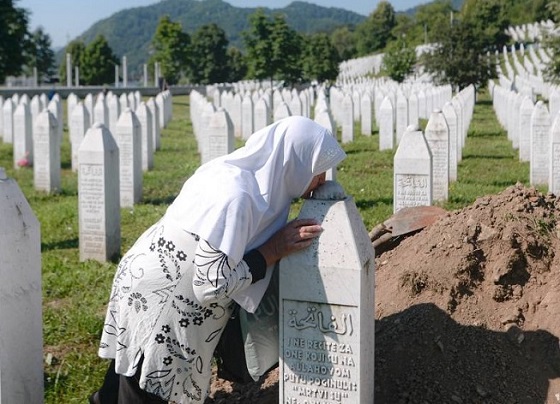A podcast featuring a De Montfort University Leicester (DMU) academic that tells the story of the Bosnian genocide of 1995 has won two prizes in the national Audio and Radio Industry Awards (ARIAs).

The podcast, called Untold Killing, explores the events of July 1995, when more than 8,000 Bosniak Muslims were murdered in Srebrenica, Bosnia and Herzegovina, in the worst atrocity on European soil since World War Two.
Kim Sadique, Associate Professor in Community & Criminal Justice at DMU, shares the testimony of genocide survivor Kada Hotić in the podcast.
Untold Killing received a Silver and a Bronze award and the prizes come as people in the UK prepare to mark Srebrenica Memorial Week, from this Sunday, with the theme ‘Rebuilding Lives’.
Kim, who is chair of the East Midlands board of Remembering Srebrenica, said: “I want the podcast to bring recognition to the survivors as well as those who lost their lives.

"Many Bosnian Serbs, including Milorad Dodik, the Serb member of the tripartite Presidency in Bosnia claim what happened in Srebrenica was a ‘fabricated myth’ - such denial narratives are further victimisation of survivors.
“The podcast series has had 90,000 listeners and that recognition for the survivors’ testimonies reduces the effect of the denial narratives being played out within Bosnia and elsewhere.
“In the podcast you hear the voices of the survivors speaking in Bosnian and the English voices are heard over the top. It means you feel a connection with the people telling their stories and that is vitally important. It is incredible to hear the resilience of these survivors and their ability to recount such devastating experiences.
“They are not seeking retribution. They want truth and justice as they see this as the only way to prevent genocide happening again. You are touched by these survivors in a way you cannot imagine. These awards go to them for their courage.”
Kim visited Srebrenica and then took students on what they called a ‘DMU Glocal’ trip – a combination of DMU Global and DMU Local – where they met survivors of the war.

“The students met mothers who had lost their husbands and sons in the genocide”, Kim said. “They laughed and they cried with them and the mothers said “we have lost our children but you are now our children’.
“It moved our students to tears and they all came back and pledged to do something to Remember Srebrenica. Some did art work, others wrote poetry, others ran events in their community for young people. They did anything and everything to help build stronger communities.”
RELATED NEWS
DMU's world-leading expert on Balkans publishes latest book
DMU Early Clearing is now open. Call us and find a course for you.
Be inspired. Book a place at our next DMU Open Day
Kim teaches a module to students on Religion, Faith and Crime as well as lectures on Genocide and State Crime and is the chair of DMU’s Global Peace and Transitional Justice Research Group. She feels fortunate to be in a position, as an educator, to ensure people still remember what happened in Bosnia 26 years ago and talk about how something like this can never be repeated.
She said: “The legacy of those trips to Srebrenica is all about reducing hatred and division and working in communities to get people more engaged in ways that mean they improve their understanding of each other.
“I think it is important to remember the quote from murdered MP Jo Cox ‘We are far more united and have far more in common than that which divides us’.”

This year marks the 26th anniversary of the Srebrenica genocide and the theme of ‘Rebuilding Lives’ seems pertinent for a Britain coming out of lockdown.
Kim said: “People are having to rebuild their lives because of the pandemic. Families have been left devastated after losing loved ones, companies have been fighting to stay in business and entire communities are looking to start again.
“If you think of those genocide survivors who, despite the horrendous hatred and destruction they were subjugated to, have been rebuilding their lives with dignity, humanity and without calling for revenge or the promotion of division or hatred, it is inspirational.
“So next week is a time for reaffirming our commitment to working towards the elimination of discrimination, rejecting hatred and intolerance and helping to build a safer, stronger and more cohesive society here in the UK.”
To find out more about Srebrenica Memorial Week and how you can get involved in the East Midlands visit East Midlands – Remembering Srebrenica
Posted on Friday 2 July 2021